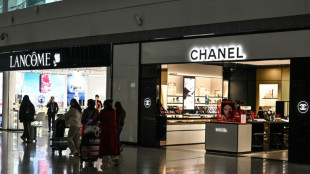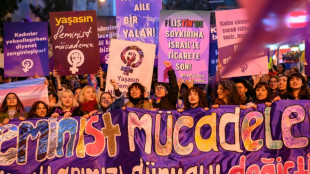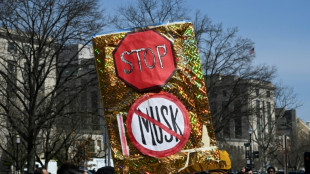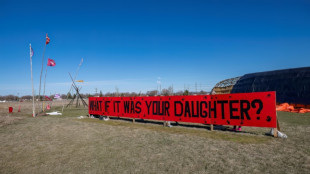

Belarus exiles find home from home in 'travelling' bar
Tucked under a bridge in downtown Warsaw is a bar like no other. Over the years, Karma has relocated from Belarus to Ukraine and Poland, in the face of repression and war.
Along the way, the watering hole has become a home away from home where tattooed young people drink beer, roll cigarettes and mix and mingle in their mother tongue.
"This bar never wanted to be a travelling bar... It was just to keep our community together," said co-owner Gleb Kovalev, sporting a dark scraggly beard and inked from head to ankle.
"After things became much more political, we had to move and we had to stay together," the hyperactive 31-year-old told AFP over a hotdog and a whiskey and coke.
The Belarusian regime staged a brutal crackdown on historic protests in 2020.
More recently, the country has served as a springboard for its ally Russia's assault on Ukraine.
The events have led thousands of Belarusians and Ukrainians to take refuge in neighbouring Poland -- a staunch critic of both the regime in Minsk and the Kremlin.
Some of the new arrivals end up at Karma.
Kovalev, who speaks seven languages, is sitting in a makeshift living room on the pavement behind the bar. There are a couple of armchairs, a tattered rug and potted plants.
It is a weekday and the night is young but already a dozen Belarusians are standing around with drinks, their laughter intermingling with the traffic overhead.
"I was in every Karma bar," said Anton Lutsevich, a 3D artist from the central town of Bobruisk, noting the familiar faces from the original location.
"Many of them are now here, many of them were in Kyiv... Karma is like a sitcom. You come here and you see the same characters," the tall 23-year-old told AFP.
His friend Andrey Makarevich once hightailed it from riot police across a Minsk cemetery.
"You know, your motherland is not a place -- it's the people from your country," said Makarevich, a 27-year-old quality assurance engineer from the northeastern city of Vitebsk.
"So here I feel like I'm at home."
- Police 'smashing faces' -
Karma first opened in the Belarusian capital in late 2017 as an art bar with music and free tattoos raffled off every Monday, a place to "make parties" as Kovalev puts it.
Then came August 9, 2020, when veteran strongman Alexander Lukashenko crushed the protests that erupted after allegations of fraud in his election to a sixth term.
"It was the night that changed everything in our lives... My bar was assaulted by riot police," Kovalev said.
"I was inside hiding people and I saw police being out of control, just like smashing faces," he added.
"I was like two metres from being arrested. So yeah, I decided to leave absolutely."
Kovalev opened another Karma in the Ukrainian capital last year, before he was again forced to pack his bags when Russia invaded.
The Warsaw edition of Karma has been up and running since June, mainly drawing Belarusians but also Ukrainians, Russian oppositionists, other foreigners and the occasional Pole.
"It's pretty much a migrant bar now... We welcome everyone who shares our values," Kovalev said.
"Like art, music, tattoos, a certain way of democracy and freedom that we didn't have in the places we escaped, and also peace."
Alex Chekonov, a regular, describes Karma as a safe place where "everybody will help you".
"It's always happy, always joy. Always funny and everybody is beautiful here," the 32-year-old IT guy told AFP.
- 'Russian roulette' -
While young and cheerful, many in the crowd have a traumatic tale or two from back home.
"I'm not going back because, yeah, I'm afraid," said Veronika Lindorenko, 32, who wore white and carried flowers at women's protests after the Belarusian election.
"There is a high risk of me being imprisoned, as I was quite active, and it's like Russian roulette -- you never know," she said, firing with her thumb and index finger like a gun.
The start-up consultant has reason to be scared: she spent 10 days locked up after one tense run-in with police while supporting striking factory workers in court.
"I don't want to remember all this stuff because for me it's quite painful," she told AFP.
Lindorenko left for Ukraine when she heard the powers-that-be wanted to interview her -- and then again started from scratch in Poland.
Kovalev has a theory about being an immigrant.
"You know, it's very hard to lose everything only for the first time. Then the second time, it's fine. And the third," he said.
"It's going to be even easier now because there are so many people who lost everything, like me.
"You just have to unite and recreate it."
A.Thys--JdB



